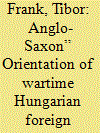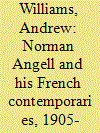| Srl | Item |
| 1 |
ID:
086310


|
|
|
|
|
| Publication |
2008.
|
| Summary/Abstract |
Although many analysts on the European continent use the term Anglo-Saxon to refer to a presumed close political association between Britain and the United States, the fact is that for more than a century the two countries competed for global influence. In fact, for well more than a century beginning at least early in the 19th century the United States regularly challenged Britain's global role - eventually replacing Britain as the dominant global power. In this competition, the United States adopted a brutally realist 'power politics' approach to Britain, while the latter focused on the challenge from another global contender, Germany. Today, when Britain's future role clearly lies with the European Union (EU) and the United States has entered upon a period of decline, Britain's role, and that of the EU, is to help the United States to move on so that it does not threaten values that are dear to Europe. Britain can play a role in this if it is acceptable, both within the framework of the EU and to the United States.
|
|
|
|
|
|
|
|
|
|
|
|
|
|
|
|
| 2 |
ID:
142871


|
|
|
|
|
| Summary/Abstract |
The political élite of Hungary included a group that expected British and American support for Hungarian revisionist claims after the Paris Peace Conference. Their acknowledged leader was Count István Bethlen, the prime minister from 1921 to 1931 and an adviser to Regent Vice-Admiral Miklós Horthy until 1944. This analysis investigates a largely forgotten member of this group. Antal Ullein-Reviczky, a diplomat and scholar, shifted from being a Hungarian nationalist with an anti-Nazi attitude towards secret efforts to establish political relations with Britain during the Second World War. Press chief of the Foreign Ministry and the prime minister’s office, Ullein-Reviczky’s last appointment was Hungarian minister at Stockholm in 1943–1944. Both the Germans and the British put little trust in a man whose wife was the daughter of a British diplomat, yet who maintained superb connexions in pro-German Hungary. He changed his mind gradually when he realised that the price for revising the Treaty of Trianon was unacceptable. His long journey through international politics made him a significant player in a global drama, also assisting Raoul Wallenberg’s mission to Budapest. It is a political odyssey worth remembering.
|
|
|
|
|
|
|
|
|
|
|
|
|
|
|
|
| 3 |
ID:
101062


|
|
|
|
|
| Publication |
2010.
|
| Summary/Abstract |
On the occasion of the Centenary of the publication of Norman Angell's The Great Illusion, this article explores the extent to which Angell was influenced by his French contemporaries. He was living in France for the ten years previous to the book's publication and working as a newspaper editor and commentator. The main currents of French political thinking of that period are explored. The main conclusion reached is that Angell had little impact on French thinking at the time and it had not much on him. But it is argued that the reasons for this seeming mutual ignorance had profound effects on the development of thinking about international relations before 1914 and continue to haunt the way we think about IR in the "Anglo-Saxon" countries and in France itself.
|
|
|
|
|
|
|
|
|
|
|
|
|
|
|
|